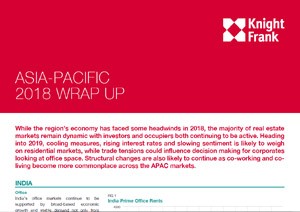
While the region’s economy has faced some headwinds in 2018, the majority of real estate
markets remain dynamic with investors and occupiers both continuing to be active. Heading into 2019, cooling measures, rising interest rates and slowing sentiment is likely to weigh on residential markets, while trade tensions could influence decision making for corporates looking at office space. Structural changes are also likely to continue as co-working and coliving become more commonplace across the APAC markets.
ASEAN
Office
Prime office rents in Singapore have seen significant movement this year rising 21%* in 2018 as the city’s limited supply outlook favoured landlords. However, heading into 2019, rental growth is expected to be more muted as the visibility of 2020’s supply looms ever closer.
Moving into 2019, the Kuala Lumpur office sector will remain firmly tenant-led as there is no immediate catalyst to boost demand. Although the rise of the shared office / co working segment provides a breather to a market with oversupply, with additional stock expected, there are further headwinds ahead. Both rental and occupancy levels will remain
under pressure as landlords continue to offer attractive leasing options to attract new occupiers and retain existing tenants.
Strong demand drove prime rents up 4.4%* to THB1,045 per square meter per month in Bangkok as occupiers sought out higher quality space within this sub-market. However, with new supply coming onstream from 2020 onwards, the pace of increases could be kept in check.






